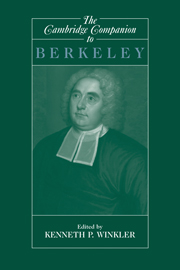Book contents
- Frontmatter
- Introduction
- 1 Berkeley’s life and works
- 2 Was Berkeley an empiricist or a rationalist?
- 3 Berkeley’s notebooks
- 4 Berkeley’s theory of vision and its reception
- 5 Berkeley and the doctrine of signs
- 6 Berkeley’s argument for immaterialism
- 7 Berkeley on minds and agency
- 8 Berkeley’s natural philosophy and philosophy of science
- 9 Berkeley’s philosophy of mathematics
- 10 Berkeley’s moral and political philosophy
- 11 Berkeley’s economic writings
- 12 Berkeley on religion
- Appendix
- Bibliography
- Index
8 - Berkeley’s natural philosophy and philosophy of science
Published online by Cambridge University Press: 28 August 2006
- Frontmatter
- Introduction
- 1 Berkeley’s life and works
- 2 Was Berkeley an empiricist or a rationalist?
- 3 Berkeley’s notebooks
- 4 Berkeley’s theory of vision and its reception
- 5 Berkeley and the doctrine of signs
- 6 Berkeley’s argument for immaterialism
- 7 Berkeley on minds and agency
- 8 Berkeley’s natural philosophy and philosophy of science
- 9 Berkeley’s philosophy of mathematics
- 10 Berkeley’s moral and political philosophy
- 11 Berkeley’s economic writings
- 12 Berkeley on religion
- Appendix
- Bibliography
- Index
Summary
Although George Berkeley himself made no major scientific discoveries, nor formulated any novel theories, he was nonetheless actively concerned with the rapidly evolving science of the early eighteenth century. Berkeley's works display his keen interest in natural philosophy and mathematics from his earliest writings (Arithmetica, 1707) to his latest (Siris, 1744). Moreover, much of his philosophy is shaped fundamentally by his engagement with the science of his time. In Berkeley's best-known philosophical works, the Principles of Human Knowledge and Three Dialogues between Hylas and Philonous, he sets up his idealistic system in opposition to the materialist mechanism he finds in Descartes and Locke. In De Motu, Berkeley refines and extends his philosophy of science in the context of a critique of the dynamic accounts of motion offered by Newton and Leibniz. And in Siris, Berkeley's flirtation with neo-Platonism draws inspiration from the fire theory of Boerhaave, as well as Newton's aethereal speculations in the Queries of the Opticks. In examining Berkeley's critical engagement with the natural philosophy of his time, we thus will improve our understanding of not just his philosophy of science, but of his philosophical corpus as a whole.
- Type
- Chapter
- Information
- The Cambridge Companion to Berkeley , pp. 230 - 265Publisher: Cambridge University PressPrint publication year: 2005
- 51
- Cited by



